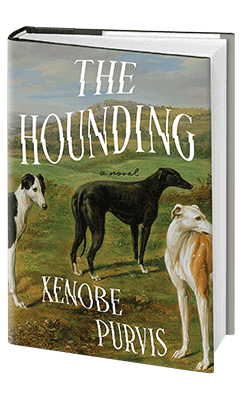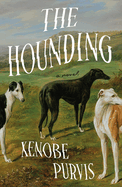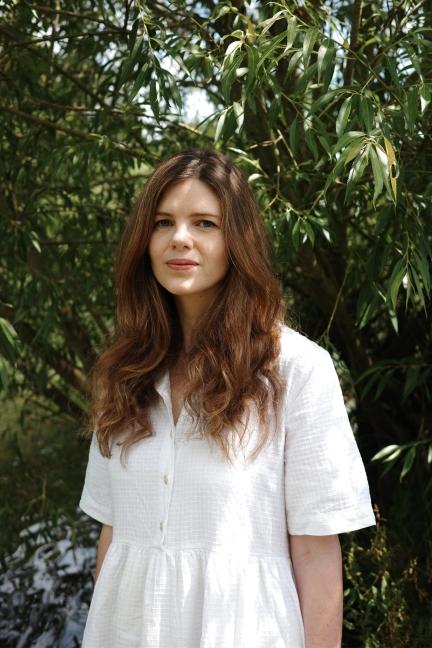The Hounding
by Xenobe Purvis
Xenobe Purvis's immersive debut novel, The Hounding, is a haunting exploration of turn-of-the-18th-century England, when men held all power, women and children had no voice, and the church and alehouse were the primary gathering places. An overriding mood of foreboding shrouds the novel. Despite its long-ago setting, however, Purvis's incisive tale may well leave readers asking how much the plight of women--and society--has changed in the years since.
The book begins with a startling scene: "The girls, the infernal heat, a fresh-dead body." The villagers of Little Nettlebed--a "vengeful mob"--advance toward the five Mansfield sisters, certain that the girls played a part in the murder. Here Purvis plants the first seeds of doubt about the girls' culpability: "They were angry about the weather and their failing crops and shallow wells, alongside all sorts of ordinary things, like the fact that their wives no longer loved them or that they would someday die."
The heat and lack of rain have caused the River Thames to recede so much that Pete Darling fears being put out of work, and it's only June. His job, as a kind of Charon figure, is to ferry people from Little Nettlebed to Greater Nettlebed, home of the church, alehouse, and marketplace. Purvis's close third-person narration moves among several characters, and the first chapter to follow the prologue scene of the advancing mob unspools from Pete's perspective. He has spied on the shore many an apparition "after a few too many pints," including an angel "made of soft light, like dancing flames." His soul wrestles between ale and faith. On this day, he spies Joseph Mansfield's five granddaughters, who "looked odd to him, changed somehow.... Wild, inhuman--not girls at all."
The sisters, mourning the recent death of their grandmother, are crossing the river to have their dresses dyed black. After Pete's several attempts to converse with them are met with one-word replies from the eldest, Anne, he sees them as cold, ignoring him, and imagines them sinking slowly into the Thames, "pulled down by their dresses and petticoats." His rage overcomes him, and he lets his boat drift downstream. When her sisters grow fearful, Anne says to them, "Come... We'll wade." She slips into the water and walks ashore. Pete is ashamed: "That was the cunning power of girls, he thought. They turned a strong man weak. They made a good man penitent."
This first brilliant chapter sets up an archetypal form. The seemingly powerless upend the power structure. The "wild, inhuman" passenger-prisoners outsmart their captain-captor. And so Pete Darling becomes obsessed with these girls. Other characters' perspectives contribute clues to the inexorable progression that ends in murder, and the possible perpetrator(s). Readers hear from Temperance, who's married to the local publican and wears gloves to serve patrons in order to avoid contact with ale; she surveys the society from its edges via the men's gossip yet keeps her wits about her. After attending the funeral of the blacksmith's wife who died in childbirth, her coffin borne by six pregnant women, Temperance astutely observes "the great gruelling trial of being a woman in a world governed by men."
Readers gain further insight via Thomas Mildmay, as he crosses the Thames with Pete on his way to work as a first-time farmhand for Joseph Mansfield, and wonders at Pete's warning about the man's five granddaughters: "Thomas didn't know why these girls enraged [Pete] so much; they weren't even women, no trouble to him at all." Other perspectives come from Joseph Mansfield, the grandfather, and Robin Wildgoose, a longtime farmhand for Mansfield. Yet the girls' inner lives remain mysteries. Readers must deduce their thoughts from snippets of dialogue and their actions; thus, the author augments their enigmatic presence in the town, and in the novel--and underscores their voicelessness.
Purvis investigates what wildness means in the context of this period and place. Are the girls wild because they go about unchaperoned? Because they look on with disapproval at the men bent on killing a "monster" sturgeon stranded in the shallows of the Thames? Or is it the wildness men detect in themselves while in Anne's presence? At Thomas's first sight of Anne, he is overcome with a feeling "like ruling and serving simultaneously." And when Anne next crosses the Thames, with her grandfather, Pete positions himself at the front of the ferry so she "couldn't pass without taking [his hand]," his thoughts about Anne "as hot as hellfire."
Pete is the one who starts the rumor that the five girls are transforming into dogs. A menacing aura overtakes the novel, as the rumor spreads and tensions rise in the town. Who can they blame for the heat and the dying crops and the lack of water? The "hungry men," as Robin refers to them, go to the alehouse to find escape and leave with their minds full of fear. On their way to church, they hear the howling of dogs--dogs penned because of the recent deaths of chickens, rabbits and voles. Some suspect the Mansfield girls.
With hints of superstition akin to Shirley Jackson's "The Lottery" and the puritanical overtones of Nathaniel Hawthorne's The Scarlet Letter, Purvis's The Hounding taps into universal themes of fear, violence, lust, and also empathy. Rumors spread like infection through the town and, like its citizens, readers are left to decide what is real and what is projected outward in order to avoid looking inward. --Jennifer M. Brown








